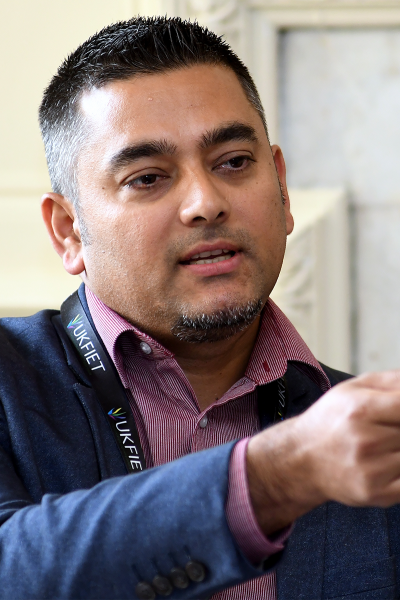Dr Tejendra Pherali is Professor of Education, Conflict and Peace at IOE.
How did you come to join IOE?
I took my academic position at IOE to develop research and teaching in the field of education in conflict and emergencies. It is a very exciting place where one gets remarkable opportunities to learn from colleagues and students; develop cutting-edge research; and engage with researchers, policy makers and practitioners from around the world.
What might it surprise people to know about you?
That's difficult to answer! Some people might find it surprising to know that I used to walk two hours every day to go to school that involved crossing a deep inundated river during the monsoon season.
What is the focus of your research?
My research focuses on politics of education in conflict-affected contexts and innovative ways of delivering quality learning in humanitarian settings. I focus on the importance of diversity, equity and justice in and through education and the power of grassroots struggles in leading positive change in their societies.
I really hope that my work contributes to the debate about conflict-sensitive educational reforms and promotion of peace and social transformation through education in the developing world. I am involved in international collaborative research projects (e.g. Lebanon, Nepal, Somaliland, Colombia, Turkey and South Africa) that aim to produce new knowledge and inform policies and practice.
Do you think being London-based benefits the work you do?
London is one of the global hubs for professional networking and it provides opportunities to engage with humanitarian and international development agencies, which is key to my research on and teaching about education in low- and middle-income countries. I harness this opportunity by connecting students with various organisations and building research partnerships.
“UCL’s commitment to tackle world’s problems through interdisciplinary research and teaching enables both students and academics to experiment new ideas, approaches and methodologies for innovations."
What working achievement or initiative are you most proud of?
I am most proud of being able to contribute to the field of education in emergencies over the past seven years. I lead the research theme on Education, Conflict and Peacebuilding, which promotes educational research in conflict-affected contexts.
We have developed a Master's programme in Education and International Development: Conflict, Emergencies and Peace and convene an annual seminar series on Education in Conflict and Emergencies.
In addition to leading or co-leading research projects in this field, I supervise doctoral students who are investigating educational issues in various conflict-affected contexts, including Afghanistan, Indonesia, Jordan, Nepal, Nigeria, Pakistan and Syria.
What's the most important thing you've learned from your students?
My students constantly inspire me by their deep commitments and motivations to support education in challenging environments.
“As we experience emergencies concerning climate change, poverty and inequalities, and mass displacement caused by conflicts, my students’ positivity and excitement give me the hope and energy to work together for educational change."
What do you enjoy most about what you do?
The most enjoyable part is the opportunity to meet and work with excellent post-graduate students from around the world who bring diverse knowledge, perspectives and practical experiences in the area of education in emergencies. It is incredibly fulfilling to see how they co-learn and are transformed at the end of their course. IOE is a vibrant academic environment where researchers are involved in ground-breaking interdisciplinary research that helps tackle most pressing global educational challenges.
What other subjects outside of your area of specialism interest you?
My field of research is already interdisciplinary, engaging with theories, policies and practice in politics, peace and conflict studies, development studies, sociology, engineering, and education. I am also interested in ethics and decolonial approach to educational research, promoting southern epistemologies.
 Close
Close


